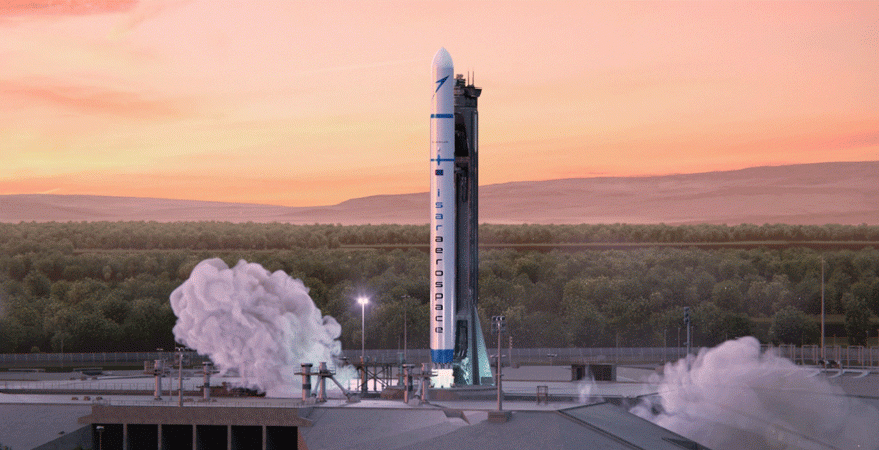30.03.2023

WASHINGTON — German launch vehicle developer Isar Aerospace announced March 28 it raised $165 million to scale up production of its Spectrum rocket scheduled to make its first flight later this year.
The Munich-based company said it raised the Series C round from a group of European investors that included 7-Industries Holding, Bayern Kapital via its Scale Up Fund Bavaria, Earlybird Venture Capital, HV Capital, Lakestar, Lombard Odier Investment Managers, Porsche Automobil Holding SE (Porsche SE), UVC Partners and Vsquared Ventures. HV Capital and Porsche SE will take seats on Isar’s board as part of the funding round.
The funding was the first Isar Aerospace raised since adding $75 million to its Series B round in July 2021. The company has raised more than $330 million to date. Isar did not disclose the valuation of the company in this round, but David Kownator, chief financial officer of Isar, said in a statement that it was an increase from the previous round.
“The strong interest and commitment from our international investors signals their confidence in our vision and technological capabilities,” Daniel Metzler, co-founder and chief executive of Isar, said in a statement. “This financing round marks another important step on our journey to orbit.”
The company says the funding will go towards final development of its Spectrum rocket, capable of placing up to 1,000 kilograms into low Earth orbit. It will also support efforts to scale up production of the rocket.
Spectrum is in final phases of development, with a first launch scheduled for the second half of this year from a launch site in Andøya, Norway. Company officials said at the Satellite 2023 conference earlier this month that work included completing qualification testing of the Aquila engine that powers the rocket, including 124 hotfire tests at its test site in Esrange, Sweden, 11 of which were in one day. The company is also manufacturing flight hardware and completing work on launch site infrastructure.
The funding ensures the company has enough runway to get through development and into operations. At the time of the conference, executives said the funding they had was enough to get beyond the first launch with margin in the event of a launch failure.
That is important because similar vehicles suffered failures on their inaugural launches. Three American companies that have developed vehicles with payload capacities similar to Spectrum all failed to reach orbit on their first launches. Firefly Aerospace’s Alpha failed on its first launch in September 2021 but reached orbit on its second launch a little more than a year later. ABL Space Systems’ RS1 rocket malfunctioned shortly after liftoff on its first flight in January, while Relativity Space’s Terran 1 failed on its inaugural launch March 22 when its upper-stage engine shut down immediately after ignition.
The funding will also support efforts by the company to scale up production of Spectrum, making extensive use of automation and additive manufacturing technologies. That includes plans for up to four launches in 2024, with a capacity in its current factory to produce up to eight rockets a year. Isar has plans for a second factory that would ultimately be able to produce up to one rocket a week.
“We’ve seen the industry thinking much, much bigger, especially when it comes to constellation deployment,” Metzler said during a conference panel March 14. “We set out to think how we can automate a lot of the manufacturing, how can we make it scalable.” That requires vertical integration, he said, with most of the rocket’s components produced in-house.
The company has signed up several customers, with the first two flights allocated to payloads from the German space agency DLR and European Space Agency through an initiative called “Boost!” to support development of commercial small launch vehicles. Isar has announced several commercial customers, including a Jan. 25 agreement with American launch aggregator Spaceflight Inc. for one dedicated Spectrum launch and an option for a second.
While many dozens of companies are pursuing small launch vehicles, he said on the panel he was confident there was room for Isar’s Spectrum. Most of those companies, he said, exist only on paper, with little funding and hardware. “There’s only actually a few that have shown significant progress.”
“I think you will always have different players in different geographies,” he said. “There’s definitely not going to be 100 rocket companies commercially succeeding, I think.”
As Isar Aerospace raises its funding round, the largest so far this year for any space company, another launch vehicle operator continues to struggle. Virgin Orbit announced March 15 it paused operations and furloughed most of its staff as it attempted to raise more money to return its LauncherOne vehicle to flight.
Virgin Orbit said March 22 it was bringing some employees back to continue preparations for that next LauncherOne mission as it attempted to finalize a reported $200 million investment from Matthew Brown Companies, a Texas-based venture capital firm. However, industry sources said the company has postponed plans to bring back more employees when that deal fell through.

